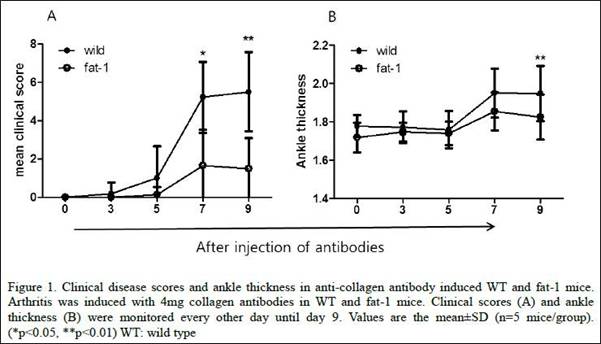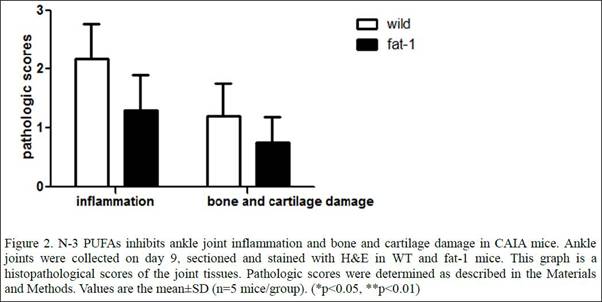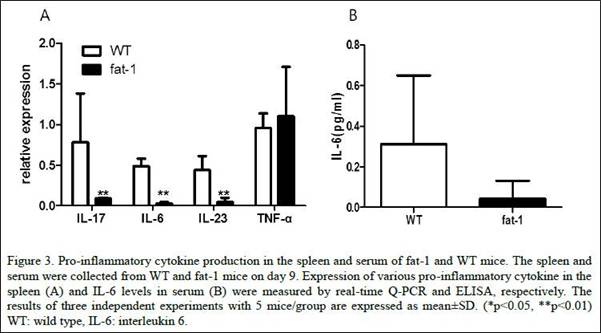Session Information
Session Type: ACR Poster Session A
Session Time: 9:00AM-11:00AM
Background/Purpose: N-3 polyunsaturated fatty acids (PUFA) have anti-inflammatory effects and were considered useful for the treatment of rheumatoid arthritis (RA), however the mechanism is still unclear. Interleukin 17 (IL-17) is a pro-inflammatory cytokine produced by T helper 17 (Th17) cells which cause tissue inflammation and bone erosion. In contrast, regulatory T (Treg) cells down-regulate various immune responses by suppression of naïve T cells. The imbalance between Th17 cells and Treg cell is important for the pathogenesis of RA. We investigated whether n-3 PUFAs attenuate collagen antibody-induced arthritis (CAIA) using fat-1 transgenic mice which contain the fat-1 gene from Caenorhabditis elegans in which n-6 PUFAs are converted into n-3 PUFAs in vivo.
Methods: To induce arthritis, the AthritoMabTMCllmAb cocktail (4 mg/mouse, MD bioscience GmbH, Zurich, Switzerland) was injected intravenously. Three days after antibody administration, 100 µg LPS (Escherichria coli 055:B5; MD Biosciences) was injected intra-peritoneally. The severity of arthritis was assessed by clinical arthritis score and hind paw thickness. On day 9, the mice were sacrificed and joint tissues were harvested from each animal for end point histology. IL-6, IL-17 and IL-23 levels in whole blood were determined using Milliplex¢ç MAP kit (KomaBiotech, Korea). Flow cytometry analysis was conducted for Treg analysis.
Results: Clinical score was significantly attenuated in fat-1 mice compared to wild type on day 7 (1.6¡¾1.8, p=0.012) and day 9 (1.5¡¾1.6, p=0.003). Ankle thickness was also decreased significantly in fat-1 mice compared to WT (1.82¡¾0.11, p=0.008) (Fig 1). The pathologic finding showed that inflamed cell infiltration and bone destruction were reduced in fat-1 mice compared to WT (p<0.05) (Fig 2). The expression levels of IL-17 and related cytokines including IL-6 and IL-23 decreased in the spleen and ankle joint tissue of fat-1 mice. Furthermore, Treg cells were expanded in the spleen of fat-1 mice and Treg cell differentiation was higher in fat-1 mice than in wild type (p<0.033) (Fig 3).
Conclusion: These data suggest that n-3 PUFAs attenuate arthritis through increasing the number of Tregs and reducing IL-17 production. Therefore, dietary supplementation of n-3 PUFAs may be a promising therapeutic potential for the treatment of RA. 

To cite this abstract in AMA style:
Shim SC, Yoo IS, Park CK, Kim JY, Kim YM, Lim K, Kim KH, Kim J, Lee SY. N-3 Polyunsaturated Fatty Acids in Fat-1 Mice Attenuate Collagen Antibody-Induced Arthritis [abstract]. Arthritis Rheumatol. 2016; 68 (suppl 10). https://acrabstracts.org/abstract/n-3-polyunsaturated-fatty-acids-in-fat-1-mice-attenuate-collagen-antibody-induced-arthritis/. Accessed .« Back to 2016 ACR/ARHP Annual Meeting
ACR Meeting Abstracts - https://acrabstracts.org/abstract/n-3-polyunsaturated-fatty-acids-in-fat-1-mice-attenuate-collagen-antibody-induced-arthritis/

